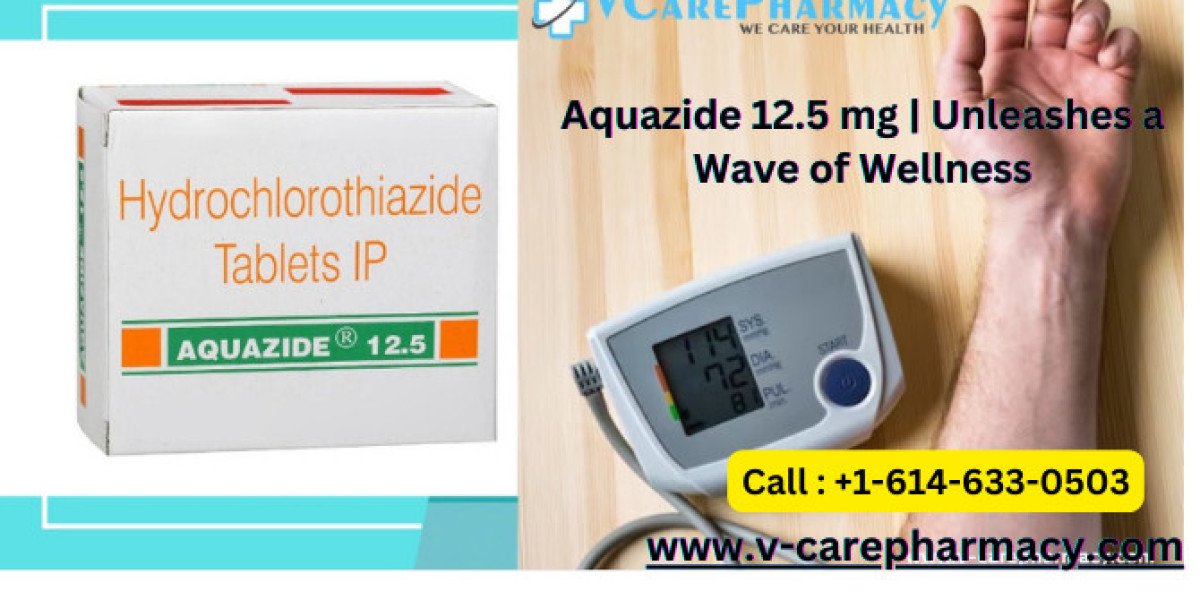Aquazide 12.5 mg is a medication primarily prescribed to treat high blood pressure (hypertension) and edema (fluid retention) caused by various conditions such as heart failure, liver disease, or kidney problems. This medication belongs to a class of drugs known as diuretics or water pills. In this blog post, we will delve into the uses, side effects, and precautions associated with Aquazide 12.5 mg.
Understanding Aquazide 12.5 mg
Aquazide 12.5 mg contains the active ingredient hydrochlorothiazide, which works by increasing the amount of urine produced by the kidneys. This helps the body get rid of excess salt and water, thereby lowering blood pressure and reducing fluid buildup in tissues.
Uses of Aquazide 12.5 mg
Hypertension Management: Aquazide 12.5 mg is commonly prescribed to help lower blood pressure in individuals with hypertension. By reducing fluid volume in the bloodstream, it helps decrease the pressure exerted on the walls of blood vessels, promoting better blood flow and reducing the risk of cardiovascular complications.
Edema Treatment: Aquazide 12.5 mg is also used to treat edema, which is the swelling caused by fluid retention in the body's tissues. Conditions such as heart failure, liver cirrhosis, and kidney disorders can lead to edema, and Aquazide helps alleviate this symptom by increasing urine output and reducing fluid buildup.
Side Effects of Aquazide 12.5 mg
While Aquazide 12.5 mg is generally well-tolerated, it may cause certain side effects in some individuals. Common side effects include:
Frequent Urination: Due to its diuretic action, Aquazide may increase the frequency of urination, especially during the initial stages of treatment.
Electrolyte Imbalance: Prolonged use of Aquazide can lead to electrolyte imbalances, particularly low levels of potassium (hypokalemia), sodium (hyponatremia), and magnesium (hypomagnesemia). This may manifest as muscle weakness, cramps, irregular heartbeat, or fatigue.
Dizziness or Lightheadedness: Some individuals may experience dizziness or lightheadedness, especially upon standing up quickly. This effect is more common during the initial period of treatment or when dosage adjustments are made.
Increased Sensitivity to Sunlight: Aquazide can make your skin more sensitive to sunlight, increasing the risk of sunburn or skin rash. It is advisable to use sunscreen and wear protective clothing when outdoors.
Gastrointestinal Disturbances: Some individuals may experience gastrointestinal side effects such as nausea, vomiting, or diarrhea while taking Aquazide.
Precautions When Taking Aquazide 12.5 mg
Regular Monitoring: It is essential to monitor blood pressure and electrolyte levels regularly while taking Aquazide 12.5 mg, especially during the initial phase of treatment or when dosage adjustments are made.
Dietary Considerations: Maintain a balanced diet rich in potassium-containing foods such as bananas, oranges, and leafy greens to help counteract the risk of potassium depletion associated with Aquazide therapy.
Avoid Alcohol: Limit alcohol consumption while taking Aquazide, as it can increase the risk of dehydration and exacerbate certain side effects such as dizziness or drowsiness.
Inform Your Healthcare Provider: Inform your healthcare provider about any existing medical conditions, allergies, or medications you are currently taking, as they may interact with Aquazide and affect its efficacy or safety.
Pregnancy and Breastfeeding: Aquazide should be used with caution during pregnancy or breastfeeding, as it may pass into breast milk and potentially harm the baby. Consult your doctor before using Aquazide if you are pregnant or nursing.
In conclusion, Aquazide 12.5 mg is an effective medication for managing hypertension and edema, but it is essential to use it under the guidance of a healthcare professional. By understanding its uses, side effects, and precautions, you can maximize the benefits of Aquazide while minimizing the risk of adverse effects. If you experience any persistent or severe side effects while taking Aquazide, consult your doctor promptly for further evaluation and management.








